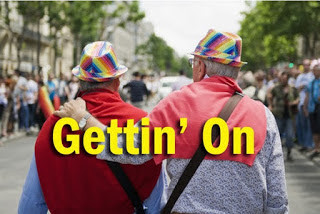From the Philadelphia Gay News
March 16, 2017
By David Griffith
Growing older comes with many challenges. These challenges are made far greater when people are aging without the necessary social supports.
In a study from the Brookdale Center for Healthy Aging & Longevity, it was revealed that 20 percent of LGBT older adults had no one whom they could call in a time of crisis. That’s a staggering figure, and one that should concern LGBT people of all ages. A sizeable portion of our LGBT elder community is aging without any social support.
For people of all sexual orientations and gender identities, aging comes with the challenge of maintaining social ties. After retirement, many see their social networks start to fade based on no longer being connected to coworkers. As folks get older, most will experience having friends and loved ones pass away. Other relationships may become difficult to maintain due to geographic distances and transportation challenges.
These experiences are often even more pronounced within the LGBT community. Many LGBT older adults have become estranged from family members throughout their lives. The majority of LGBT elders do not have children or grandchildren, often a major source of support for non-LGBT seniors. A majority of LGBT older adults live alone. While many people who live by themselves still maintain vibrant and active social lives, it can come with an added challenge of being proactive about maintaining relationships.
The consequences of lacking social support are pretty dire. Social isolation has been linked to higher rates of heart disease, depression, a weakened immune system and dementia. According to a 2012 study out of the University of California-San Francisco, older adults who described themselves as being lonely had a 59-percent greater risk of functional decline and a 45-percent greater risk of death.
The following activities can be useful steps to sustain existing relationships and to form new social connections. These options are all low-cost and easy to access.
Schedule a time to call a friend. Chatting with a friend is a great way to maintain connections and to feel support from another person. Setting a regular schedule for calling a friend can make it easier to follow through and to structure it as part of your daily schedule.
Take an exercise class. Not only will an exercise class improve your physical health, it will also provide the opportunity for meeting new people. There is a great variety of classes available, offering different levels of intensity and various types of activities. This can all be done without having to purchase an expensive gym membership. Consider joining a walking group or checking out a fitness center at a local senior center.
Use technology to stay engaged. The Internet offers great opportunity to connect with friends who may not be living in your neighborhood. Many older adults have started to use social media, such as Facebook, to stay connected with important people in their lives. For those unfamiliar with technology, there are several free or low-cost classes available to help you become more comfortable with computers and using the Internet.
Take a class. Learning can continue to happen at all ages. Lifelong learning programs, often offered through local universities, provide the opportunity to take classes on topics of interest. An added benefit is getting to know others who share your interests. These social connections can last even once a class has finished.
Volunteer. There are hundreds of volunteer opportunities out there that offer a wide variety of activities with different responsibilities and time commitments. Volunteering can be a great way to give back while utilizing your skills and learning new things. It’s also a way to meet new people who have similar interests.
Visit a senior center or community center. Senior centers are a great community resource that offer plenty of opportunity for social interaction and meeting new people. As part of a low-cost membership, older adults are able to take classes, go on outings, play games, participate in discussion groups, have meals and socialize with friends. Your local Area Agency on Aging can help connect you to senior centers in your community.
If you are not someone who is isolated, there is plenty that you can do to help those who are. Reach out to a friend you haven’t talked to in a while. Invite a neighbor with you to one of your planned activities. Organize an outing or social event for people in your building or neighborhood. There is a role for all us in preventing the adverse effects of social isolation among our LGBT elders.
David Griffith is the director of programs and outreach for the LGBT Elder Initiative. To learn more about the LGBT Elder Initiative and upcoming programs for LGBT older adults, visit www.elderinitiative.waygay.org.

